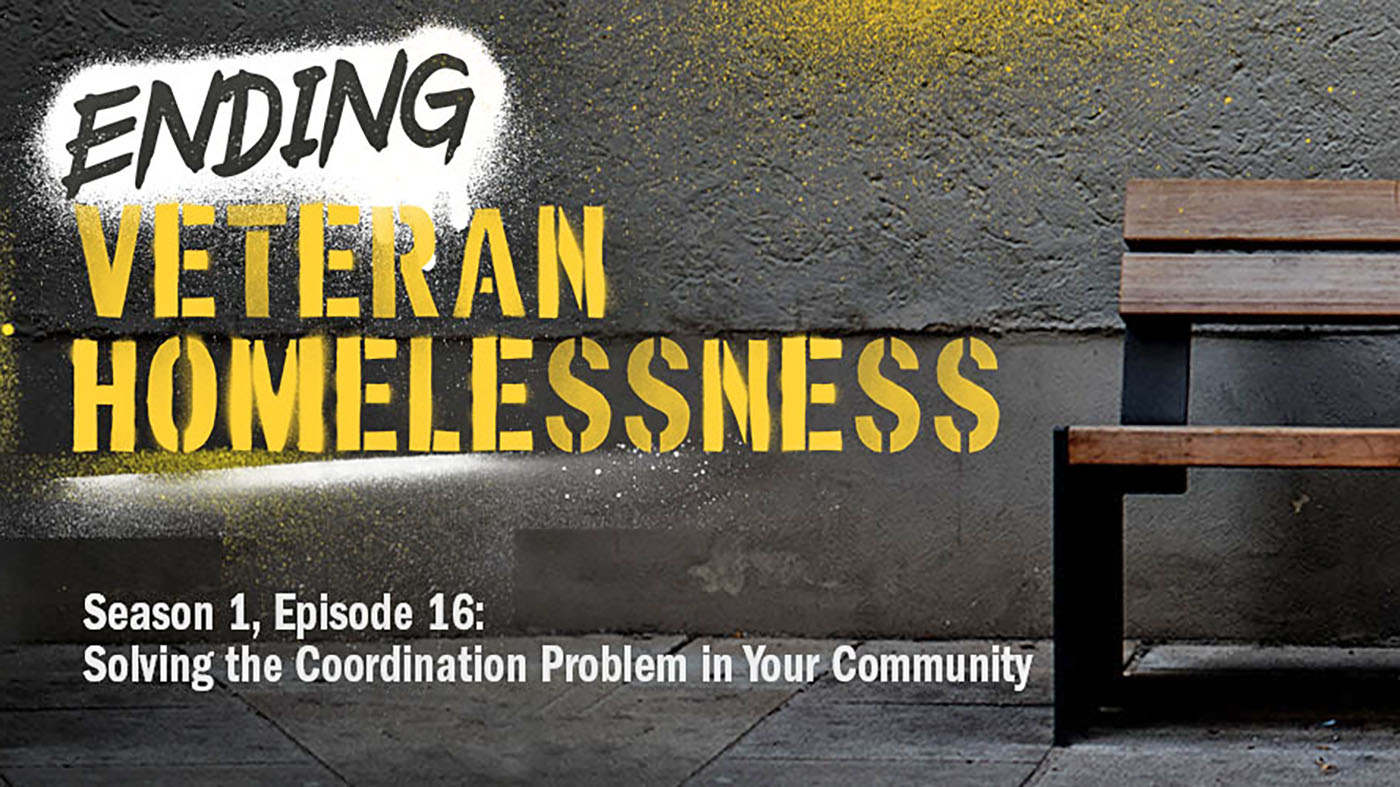For as long as teams have existed, coordination among team members has been essential for achieving goals and solving problems. Whether it be a country taking on the momentous task of fighting a war or a sports team coming together to win a game, coordination is key when working toward a shared goal.
These truths are no different when it comes to coordinating assistance for Veterans experiencing or at risk of homelessness. Without proper collaboration, it can be challenging to identify and implement solutions quickly and effectively.
On this Ending Veteran Homelessness podcast, we are joined by Eileen Devine, national director for Health Care for Homeless Veterans, to discuss how coordinated entry has impacted the ability to house Veterans more efficiently.
Listen to “S1EP16: Solving the Coordination Problem in Your Community” on Spreaker.
Understanding coordinated entry
Coordinated entry (CE) systems leverage cooperation between local homeless agencies and service providers to create a strong crisis response system. These groups work together as a unit instead of making individual decisions about who to serve and how best to serve them. This allows the system to effectively connect those experiencing homelessness with stable housing and supportive services.
Bringing together different service providers with expertise in various areas helps ensure that there is no overlap in efforts and that everyone is informed of what activities are taking place for which Veterans.
“We need to be coordinated with our community partners,” said Devine. “We need to be relying on what they do best, their expertise in the communities, knowing that it is probably different than ours and would add to the care for homeless Veterans in our communities.”
Why coordinated entry matters
Coordination can be difficult for a number of reasons: Communication barriers amongst group members, a discouragement over a perceived lack of immediate progress being made, or the need for certain groups to give up some power or autonomy for the greater good. Getting these different groups coordinated, all with their own missions, visions and goals for the future is an important step.
A single nonprofit may only provide a few different services that are needed by a Veteran. They may pay for some bills and food, but they don’t provide services for employment. This may leave Veterans feeling frustrated with the care they’ve received, or unsure of where to turn next.
The benefit of coordinated entry is that Veterans don’t have to wonder what the next step is. They know they will be cared for no matter where they show up in the system.
“Rural communities, urban communities, every part of our country where there are homeless individuals, there needs to be this coordination,” Devine added.
Coordinating for the future
The needs of Veterans are ever-changing, and to provide the best care possible, stakeholders must modify and update their efforts on a regular basis.
When we reflect on lessons learned from past experiences and consult with Veterans who have been through the experience of homelessness, we’re able to better provide for the Veterans to come. We’re grateful to have team members, both at VA and in the larger community, who are committed to getting coordinated entry to its most effective state.
“It really is their life’s work, not just a job but their life’s work, to help these individuals get to a better place. That is why we have been so successful in doing this work. I’m not saying it’s over. I think everyone realizes there’s a lot more to be done,” Devine said.
Learn about VA programs
- If you’re a Veteran who is homeless or at risk of homelessness, call the National Call Center for Homeless Veterans at 877-4AID-VET (877-424-3838).
- Visit the VA Homeless Programs website to learn about housing initiatives and other programs for Veterans exiting homelessness.
- Check out the Ending Veteran Homelessness podcast to learn more about what VA is doing about Veteran homelessness.
- Learn about how to get involved with housing homeless Veterans.
- Learn more about coordinated entry programs.
Topics in this story
Link Disclaimer
This page includes links to other websites outside our control and jurisdiction. VA is not responsible for the privacy practices or the content of non-VA Web sites. We encourage you to review the privacy policy or terms and conditions of those sites to fully understand what information is collected and how it is used.
More Stories
Study underscores important role COVID vaccination can have in protecting Veterans from infection and reducing long-term health consequences
Columbia VA’s robotic surgery teams completed their 800th robotic surgery and are on schedule to hit 1,000 by the end of the year.
In a decentralized clinical trial, Veterans can participate from their own homes or local VA instead of having to travel to a research site.







I sought assistance when moved back up here to Alaska and found the VA HUDVASH and Catholic Charities to work against me as a female older Veteran. CC did not return phone calls until a month later when notified the VA HUDVASH had found a room for rent, CC called that day. It sure appears was set to not help me when CC told me since housed no longer eligible but asked for assistance with deposits, told just call back despite telling her I needed help. Referred me to food boxes, but senior food box takes 60 days to get signed up. Very distressing….